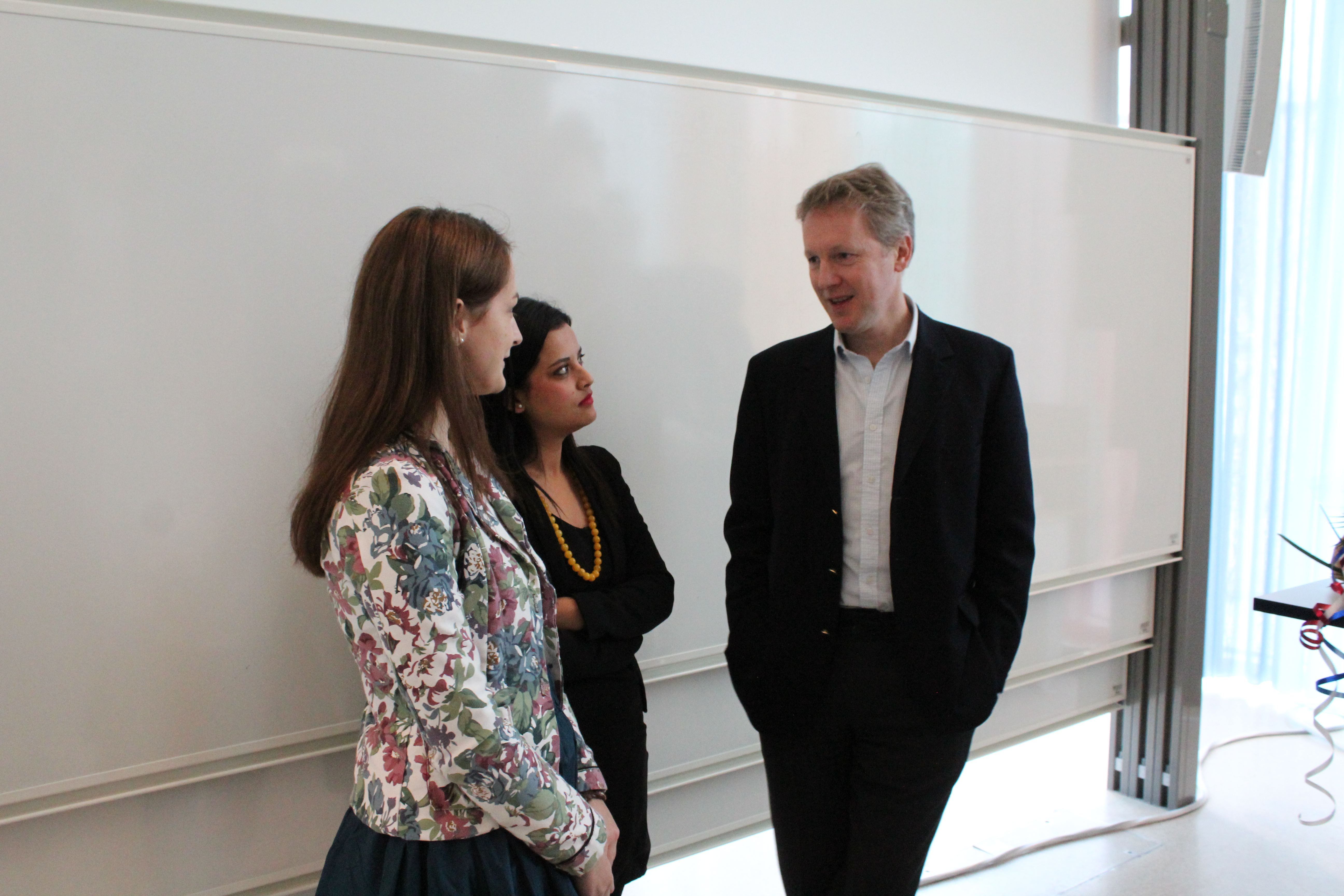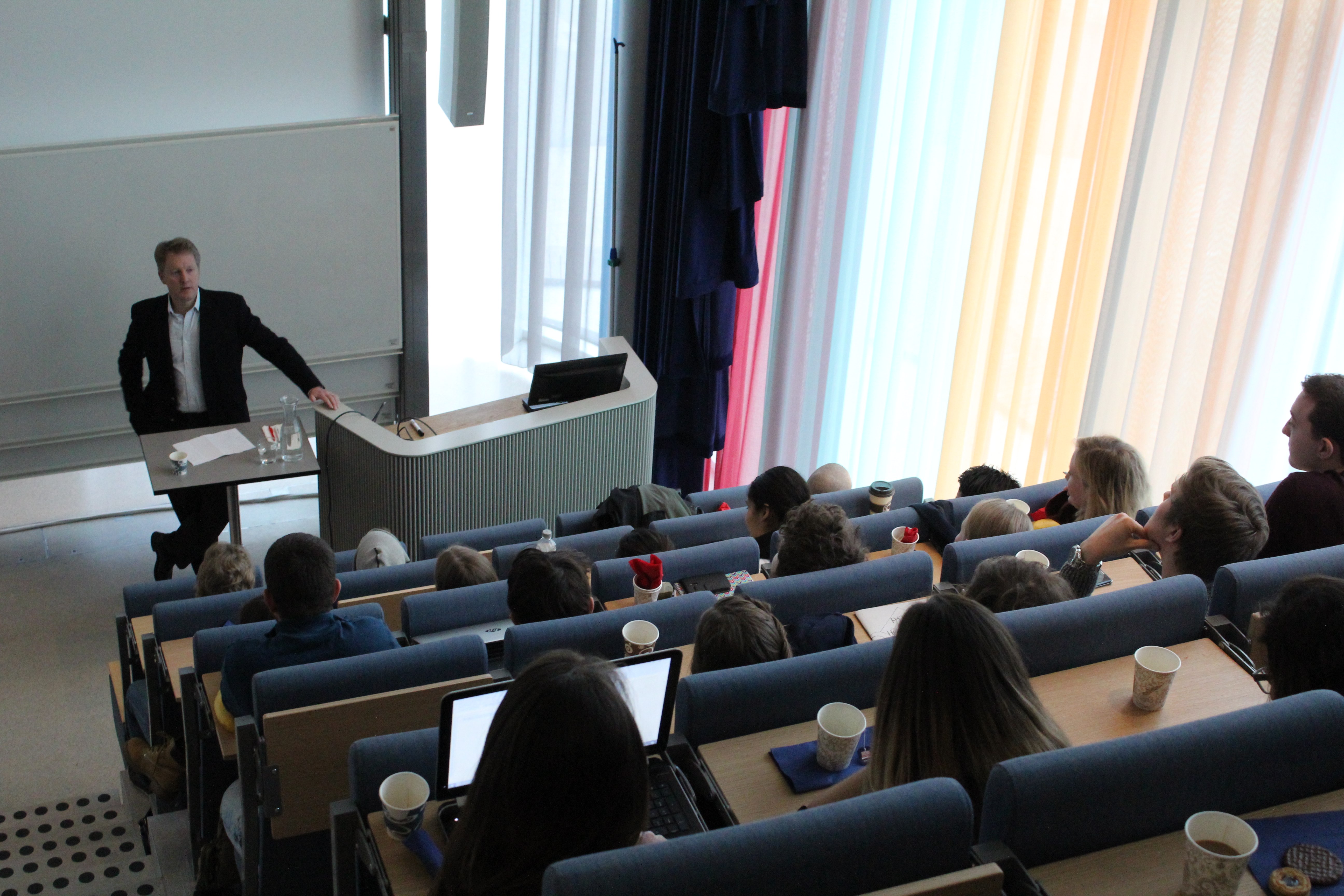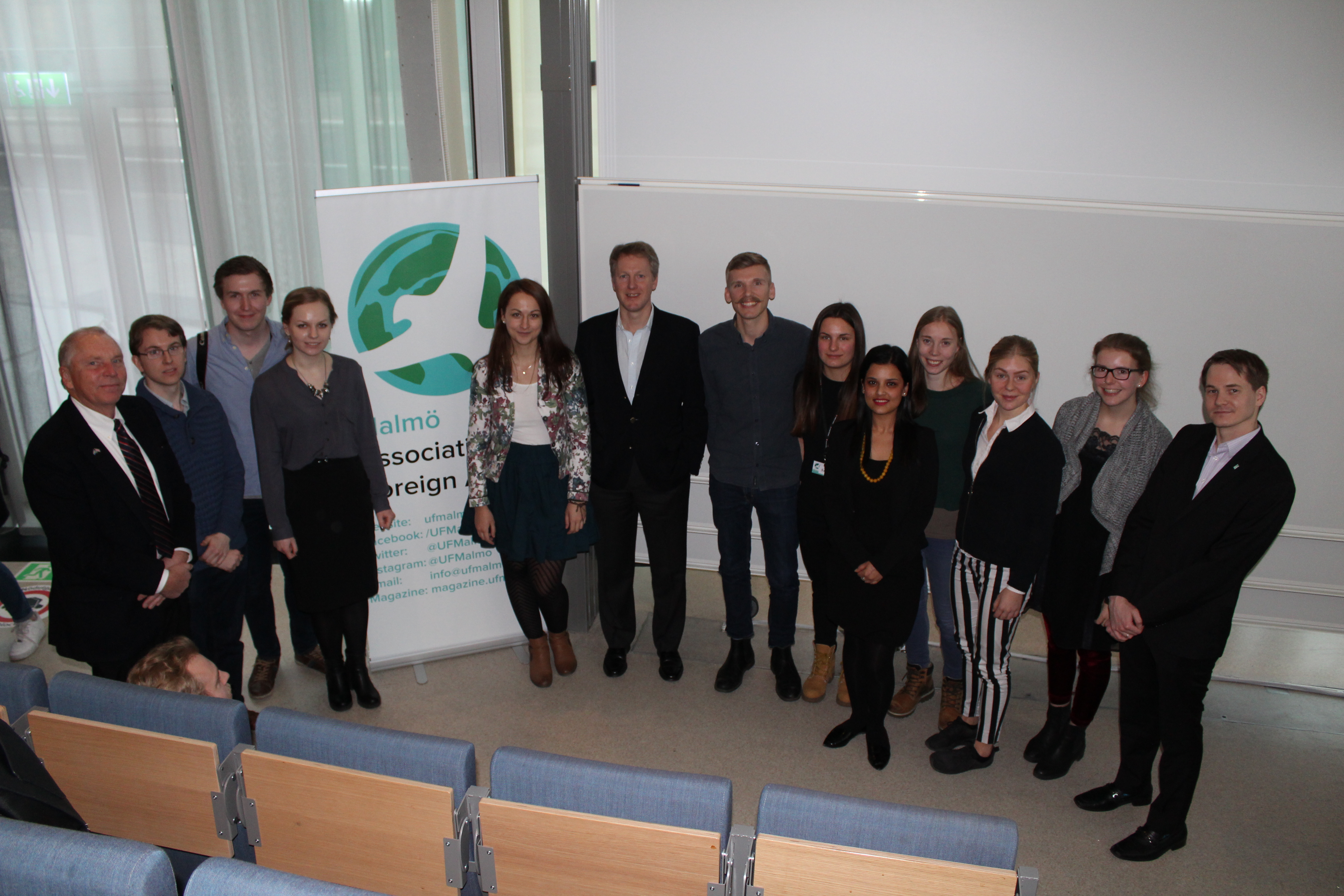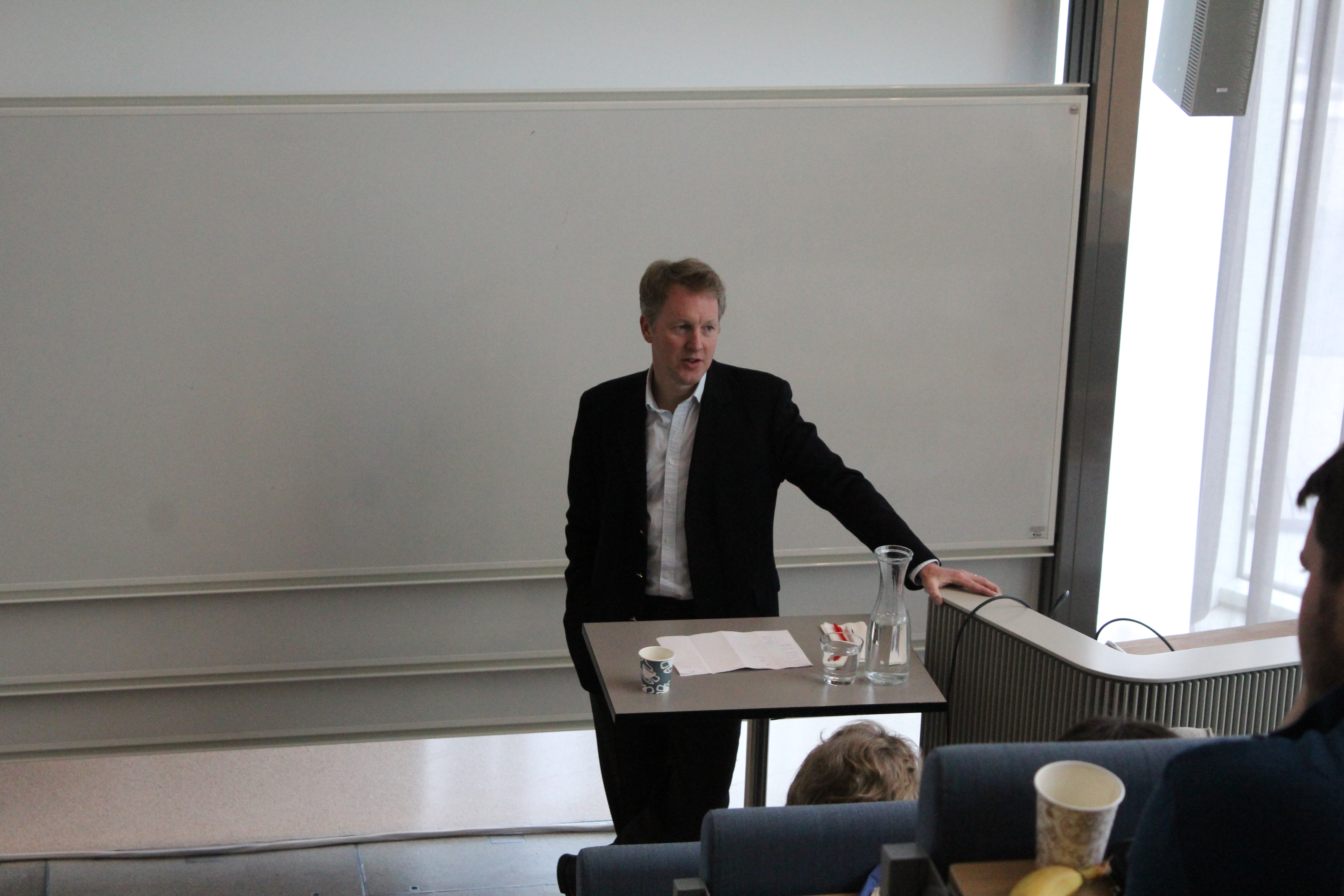On January 25th, Malmö högskola hosted His Excellency David Cairns, the United Kingdom Ambassador to Sweden. Mr. Cairns has had a long career with the British Foreign Office and shared some of his insights and experiences with the students. Pike and Hurricane also had a chance to sit down with the Ambassador and ask him about his career, the latest developments in world politics and, most importantly, how to get a job doing what he does.
He has nothing but good things to say about a career in diplomacy, calling it “pretty unrivaled in the variety of things you get to do and the places you get to go and, of course, the people you meet.” Though, he is quick to mention, it is not exactly the path to political power: “you are not the big boss. The bosses are politicians.” And there are other drawbacks to working in the public sector, he concedes, “you’re never going to be rich. But, as I said, the quality of what you get to be involved in far and far outweighs the material side.” Nonetheless, he absolutely recommends the diplomatic track to students close to graduating who are considering their options. Cairns considers it especially important to reach out to people who, for one reason or another, are not commonly represented in diplomatic circles, since they are also among the people that the diplomatic corps represent. “We are a very popular employer, but a lot of minority communities and sometimes women as well, might think that it is not for them. And actually, we want to represent the Britain of today, and that is a very multicultural society and we have to represent that to be relevant,” says he.
 Cairns’ own journey to the British Foreign Office started at university, where he was studying Japanese. During his third year, he went on exchange to Tokyo with the intention of not just studying, but working as well, so he reached out to the embassy. “I wrote to the British Embassy in Tokyo, asking: ‘Can I have a job?’. And they said ‘No, you can’t have a job, but we will send your letter to some of the British companies who are there in Japan.” One of these companies hired him for the duration of his time in Japan, but he was still a regular visitor at the embassy, playing squash and attending holiday parties. Despite that, even though he applied for a job with the Foreign Office after graduating, he did not have high hopes. He instead got a job working for a securities firm. When he finally heard back from the Office a year later, he went into the interview with no stress or pressure. “I had a job, I was doing quite well, I was very relaxed and so, of course, it all went very smoothly. And they said ‘You are through.’ and ‘You want to join?’ and I said ‘Sure!’ and that was it,” he recalls. There were a few hiccups along the way, such as the language aptitude test – “On the basis of that actually, I wasn’t very good.” – but soon a position opened up and Cairns was on his way to Tokyo.
Cairns’ own journey to the British Foreign Office started at university, where he was studying Japanese. During his third year, he went on exchange to Tokyo with the intention of not just studying, but working as well, so he reached out to the embassy. “I wrote to the British Embassy in Tokyo, asking: ‘Can I have a job?’. And they said ‘No, you can’t have a job, but we will send your letter to some of the British companies who are there in Japan.” One of these companies hired him for the duration of his time in Japan, but he was still a regular visitor at the embassy, playing squash and attending holiday parties. Despite that, even though he applied for a job with the Foreign Office after graduating, he did not have high hopes. He instead got a job working for a securities firm. When he finally heard back from the Office a year later, he went into the interview with no stress or pressure. “I had a job, I was doing quite well, I was very relaxed and so, of course, it all went very smoothly. And they said ‘You are through.’ and ‘You want to join?’ and I said ‘Sure!’ and that was it,” he recalls. There were a few hiccups along the way, such as the language aptitude test – “On the basis of that actually, I wasn’t very good.” – but soon a position opened up and Cairns was on his way to Tokyo.
This was the part of a long career that took him to Japan twice, Geneva once and even to a British research base in Antarctica. He considers the latter to to be one of the memorable highlights of his career: “We spent a couple of days out on the ice, in tents, seeing the staff. And that is quite memorable I must say.” Now, Cairns is about a year into his four-year rotation in Sweden and is not spending too much time worrying about where he will be sent off next. “I try to enjoy the day, and enjoy being here in Sweden, which I am doing,” he says, “I’ve had a pretty lucky run so far, to be frank. We’ll see what comes up and how it comes up.”
In terms of the key skills necessary to be a successful diplomat, Cairns singles out three most important ones: analytical skills, communication skills and people skills. “You, as students,” says he, “absorb a lot of information and then you distill that down into answering questions on, I don’t know, why were the Taliban successful, or what is happening in Syria. So we do the same, but with a slightly different angle, which is ‘What should we do?’” He mentions his own first-hand experience with that question, when he was invited to sit in on an office meeting with the top Foreign Office staff, including Foreign Minister Douglas Hurd, as a junior staffer writing down the meeting’s minutes. They were discussing whether to purchase American-made Tomahawk missiles when the Minister turned to him and asked his opinion. “That was pretty scary,” remembers Cairns, “I mumbled some rubbish, completely. It was terrible. But it was a super good lesson, because of what I learned from that was actually that this is what it’s all about. On this particular issue of ‘Should we buy this?’, the answer is ‘What do I think? What should we do?’”
That anecdote goes hand-in-hand with the second set of skills that he recommends budding diplomats to practice: communicating your ideas. He recalls that in his first year with the Office, he was already expected to attend meetings and conferences and articulate the UK’s point of view on relevant issues. Even today, communication remains a big part of the job for him, as a big part of his job is appearing on Swedish radio or television to give the UK’s take on relevant issues. Cairns also reminds that it is always important to have good interpersonal skills, “Enjoying being with people, being happy to get out and meet them, trying to be a good listener to them.”
Cairns brings the same positivity and optimism to questions about current events in the world as well, focusing on finding solutions that work best for everyone. “There is a lot of discussion about what to do about Trump,” he says, “Well, the answer for us is the same as what to do about Obama or what to do about Bush or what to do about Reagan: be involved, work with him as close as we can, so that we can further our interests as best we can.” He likewise appeals to the long history of engagement with Europe that Britain had when discussing the withdrawal from the European Union. “We’ve had an ambassador here in Sweden since 1535. We have had a relationship with the continent forever, and we will continue to do so.” he says, before elaborating that it is now up to the Europeans and the British to figure out the way that this new relationship will look. “It will be different, but it doesn’t mean that it’s going to be bad.”
 However the events unfold, Cairns urges people, especially students, to get involved by either joining the foreign ministry, a non-governmental organization or going into politics. “I think the important thing for people like me and the next generation thinking about it is that the future isn’t written and you can be passive and let somebody else make it happen or you can get involved and try to make it as you think best.” So let’s sharpen up those analytical, communication and people skills and get out there, shall we?
However the events unfold, Cairns urges people, especially students, to get involved by either joining the foreign ministry, a non-governmental organization or going into politics. “I think the important thing for people like me and the next generation thinking about it is that the future isn’t written and you can be passive and let somebody else make it happen or you can get involved and try to make it as you think best.” So let’s sharpen up those analytical, communication and people skills and get out there, shall we?
Yaroslav Mikhaylov










